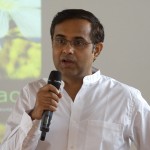Page Content 
The employment and income network of the Swiss Agency for Development and Cooperation SDC invited development practitioners to a 2 days seminar on social entrepreneurs and businesses in agriculture. The first day presented innovative examples from Switzerland and Germany. The second day looked at examples beyond Europe. Innovative business approaches were presented by social entrepreneurs and social businesses. In this video, Peter Beez, focal point of the e+i network, explains how the two concepts fit into the SDC e+i vision.
To be more specific, here a concrete example from the SDC Postcosecha initiative: Continue reading → The term social business is new to most SDC ears! And what is the difference between social business and social entrepreneurship? Jessica Graf introduces the subject and explains the two terms in two minutes:
The following posts here below provide you with two examples how social business looks in practice:
↓ Jean-Christophe Laugée presents how Danone is working with agricultural smallholders and other disadvantaged groups. And how the expansion of Danone’s socio-economic footprint maximises the company’s consumption opportunities.
↓ Ian Barker illustrates how Syngenta Foundation support to large farms in Kenya help smaller farmers and local seed sellers to increase their income and social standing. |

Jean-Christophe Laugee, Danone Ecosystem Jean-Christophe Laugée, Director at Danone Ecosystems told us about Danone’s approach to working with small dairy farmers in a sustainable way, meanwhile expanding Danone’s business into new markets. On focus was Indonesia, and Indonesian farmers were the approach target group. Continue reading →
This entry was posted in Day 2, Social business, Uncategorized on by nadjaloumbeva.

Ian Barker, Syngenta Foundation One of the main challenges small farmers in developing countries face is the lack of high quality production inputs. Ian Barker from the Syngenta Foundation described the situation of Kenyan farmers. Where low harvest is caused by low access to good quality seeds. Potatoes are the second most important crop in Kenya, after Maize. Though the production area of this crop has increased steadily, the yield is only1/3 of its potential. The project started out with one large Kenyan farm that was keen to not only increase its yields but also to create positive change within its community. The Syngenta Foundation provided the necessary know-how for the farm to grow potato seeds. Growing high quality potato seeds is complex and know-how intensive. It is best done by larger agricultural entities. The seeds are then sold to secondary, smaller neighborhood farmers who multiply the seed stock by growing seeds again on their farm plots. These seeds are sold to farmers to grow potatoes, or to the village youth who act as a third level distribution actor: selling the seeds in smaller quantities to farmers. – The renewal of the seed quality happens every third season. When the large farm inputs fresh and strong seeds into the cycle. Continue reading →
The following posts here below provide you with four examples of social entrepreneursip:
↓ Biohof Schüpenried walks the participants through the farm facilities and explains how the farm diversified its income sources.
↓ Christian Hiss explains his model of Regionalwert AG, a people’s owned stock company that invests into local agricultural value chain.
↓ Madison Ayer talks about his challenges and solutions providing the right tools for higher yields to small farmers in Kenya.
↓ Vijay Pratap Singh Aditya explains his IT platform ekgaon for small farmers in India: A mobile phone service at their fingertips! |
Ashoka is the largest network of social entrepreneurs worldwide, with nearly 3000 Ashoka Fellows in 70 countries putting their transformative ideas on a large scale. Founded in 1981, it has provided start-up financing, professional support services, and connections to a global network across the business and social sectors. It has also been a platform for people dedicated to changing the world. We had the pleasure of hearing how Stephanie Schmidt at Ashoka in North America sees social entrepreneurship, what she thinks social entrepreneurship is about, as well as find out from her about some of the challenges social entrepreneurs face in the near future. Continue reading →

Vijay Pratap Singh Aditya, CEO ekgaon Vijay Pratap Singh Aditya presented its social enterprise ekgaon. The enterprise offers small farmers in the Chhattisgarh and Madhya Pradesh region of India an IT platform that provides them with services throughout the agricultural production chain. An IT solution for farmers who: - Live in geographically very remote areas
- Rely on mono crop agriculture
- Live of very low incomes
- Abandon their agricultural activity for the search of better paid jobs
- Are illiterate (literacy level at 20%)
-
But to a large extent own mobile phones!
- Own the land they work on
The solution ekgaon proposes is as follows: Continue reading →

Madison Ayer, CEO FarmShop Meet Madison Ayer, who started his career as a venture capitalist in the United States, where he founded two companies. With this experience, Madison chose to move to Kenya where he now lives, to focus on problems more ”on the ground”. It is there that Madison founded ”Farm Shop”, a social enterprise selling agricultural inputs (seeds, fertilizers, and other agricultural input products) to farmers. Continue reading →
This entry was posted in Day 2, Social entrepreneurs, Uncategorized on bynadjaloumbeva.

Christian Hiss, CEO Regionalwert AG Imagine growing up on an organic farm, and seeing with your own eyes not just the great benefits of organic farming to the preservation and sustainability of our planet’s ecosystems, but also the challenges to organic farming growth, scaling up and profitability. This is exactly what Christian Hiss did. And he chose to address these challenges by creating – in 2006 – his own company, RegionalWert AG. Continue reading →
This entry was posted in Day 1, Social entrepreneurs, Uncategorized on bynadjaloumbeva. We started Day 1 of our workshop on how social entrepreneurship can contribute to market systems development in agriculture by having a tour of the Biohof Schüpenried – a ”cluster” of organic farming businesses close to Bern in Switzerland. Roland Münger and Markus Wüthrich – two local entrepreneurs working on the Biohof Schüpenried – showed us around the farm various facilities. Continue reading →
|
|
